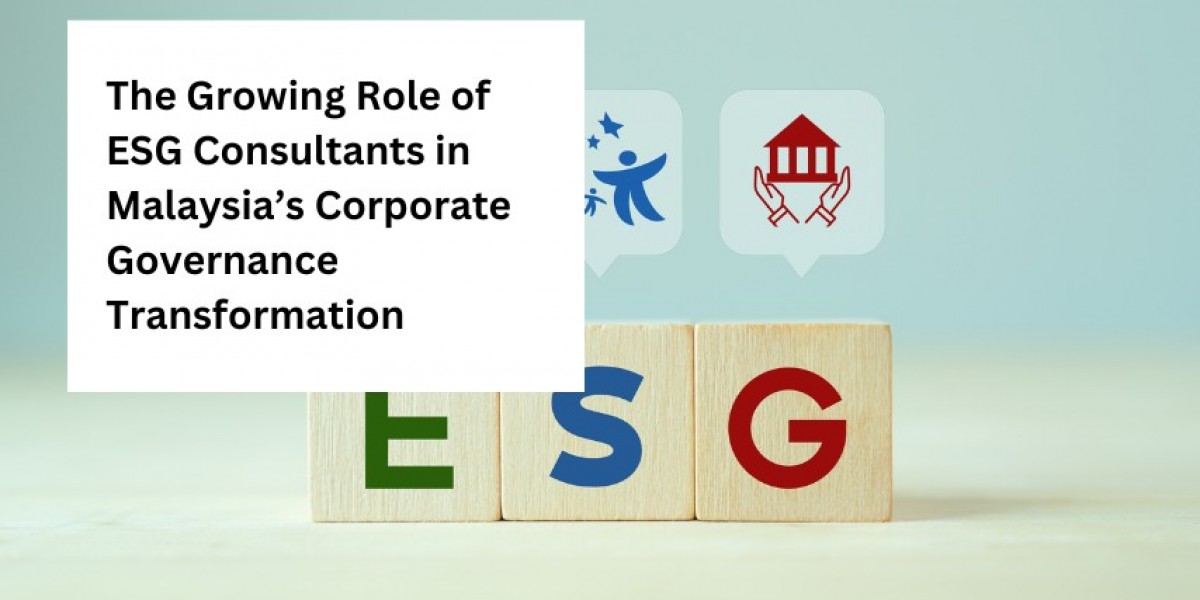The landscape of corporate governance in Malaysia is undergoing a remarkable transformation, with ESG consultants emerging as key drivers of sustainable business practices. As Malaysian businesses face increasing pressure to align with global sustainability standards, the role of ESG consultants has become more crucial than ever.
These experts are not just advisors; they're catalysts for change, helping organizations navigate complex regulatory frameworks while creating lasting value. From enhancing operational efficiency to ensuring compliance with Bursa Malaysia's sustainability reporting requirements, ESG consultants are reshaping how Malaysian companies approach governance, risk management, and stakeholder engagement.
Whether you're a business leader seeking to strengthen your ESG framework or a stakeholder interested in sustainable practices, understanding the evolving role of ESG consultants is essential for staying competitive in Malaysia's transforming corporate landscape.
The Evolution of ESG in Malaysia's Corporate Landscape
Malaysia's corporate landscape has undergone a remarkable transformation in recent years, particularly in embracing Environmental, Social, and Governance (ESG) principles. This shift reflects a broader global movement towards sustainable and responsible business practices.
Historical Development and Key Milestones
Malaysia's commitment to ESG integration began taking shape in the early 2000s. The journey started with the introduction of corporate governance guidelines by the Securities Commission Malaysia, laying the foundation for more comprehensive ESG frameworks.
A significant turning point came in 2014 when Bursa Malaysia introduced its first Sustainability Framework, mandating listed companies to disclose their sustainability practices. This move aligned with global standards and demonstrated Malaysia's dedication to sustainable development.
The regulatory framework evolved further in 2015 when the Securities Commission Malaysia launched the Malaysian Code on Corporate Governance (MCCG). This code emphasized the importance of integrating sustainability considerations into business strategies and decision-making processes.
2016 marked another crucial milestone as Bursa Malaysia implemented mandatory sustainability reporting for listed companies. This requirement pushed organizations to evaluate and disclose their environmental and social impacts, promoting greater transparency and accountability.
The momentum continued into 2017 when Malaysia became one of the first Southeast Asian countries to introduce guidelines for sustainable and responsible investment (SRI). This initiative encouraged investors to consider ESG factors in their investment decisions.
Recent years have seen increased focus on climate-related disclosures and green financing. The Securities Commission Malaysia has been instrumental in developing frameworks that support sustainable finance and encourage companies to align their operations with environmental goals.
These developments have positioned Malaysia as a regional leader in ESG implementation, with its regulatory bodies continuously refining and updating guidelines to meet evolving global standards and local needs.
Core Functions of ESG Consultants
Strategic Planning and Implementation
ESG consultants serve as strategic partners in helping organizations develop and execute comprehensive sustainability frameworks. These sustainability professionals work closely with management teams to create actionable roadmaps that align environmental, social, and governance objectives with business goals.
They analyze current business practices, identify areas for improvement, and design tailored solutions that drive sustainable growth. An experienced ESG consultant helps organizations set realistic targets, establish key performance indicators, and create implementation timelines that ensure steady progress toward sustainability goals.
Their expertise extends to developing communication strategies that effectively convey sustainability initiatives to stakeholders, from investors to employees. They also assist in creating sustainability reports that showcase progress and demonstrate commitment to ESG principles.
Risk Assessment and Management
Environmental consultants play a crucial role in identifying and mitigating ESG-related risks that could impact business operations. They conduct thorough assessments to evaluate potential environmental impacts, regulatory compliance issues, and social responsibility concerns.
These professionals help organizations understand and prepare for emerging ESG regulations, ensuring compliance while minimizing potential penalties. They also assess supply chain risks, climate-related vulnerabilities, and reputational threats that could affect business continuity.
Through detailed analysis and monitoring, ESG consultants develop robust risk management frameworks that protect organizations from potential ESG-related challenges. They implement early warning systems and create contingency plans to address potential issues before they escalate into major problems.
The sustainability professional's expertise helps organizations build resilience against ESG risks while identifying opportunities for innovation and growth. They provide ongoing support in monitoring risk indicators and adjusting strategies as needed to maintain effective risk management practices.
Regulatory Compliance and Framework
Current Regulations and Standards
Malaysia's regulatory landscape for ESG compliance has evolved significantly in recent years. The Securities Commission Malaysia (SC) and Bursa Malaysia have established comprehensive frameworks to address the growing regulatory pressure on businesses. Companies listed on Bursa Malaysia must adhere to specific regulatory requirements, including mandatory sustainability reporting and disclosure of ESG metrics.
The Malaysian Code on Corporate Governance (MCCG) serves as a cornerstone for ESG compliance, emphasizing transparency and accountability. Listed companies are required to report their sustainability practices through annual reports, focusing on environmental impact, social responsibility, and governance structures.
Bursa Malaysia's Sustainability Reporting Guide provides detailed guidelines for companies to assess and report their ESG performance. This framework aligns with international standards such as the Global Reporting Initiative (GRI) and Task Force on Climate-related Financial Disclosures (TCFD).
Future Regulatory Trends
The regulatory landscape for ESG compliance in Malaysia continues to evolve, with increasing emphasis on climate-related disclosures and social impact reporting. Experts anticipate stricter requirements for carbon emissions reporting and diversity metrics in corporate boards.
Malaysian regulators are expected to introduce more stringent ESG compliance measures, particularly in areas such as:
- Climate risk assessment and mitigation strategies
- Supply chain sustainability verification
- Social impact measurement and reporting
- Enhanced governance disclosure requirements
Companies are advised to stay proactive in adapting to these emerging regulatory trends. This includes developing robust internal controls, implementing comprehensive ESG monitoring systems, and engaging with stakeholders to ensure compliance with future regulations.
The integration of technology in ESG compliance monitoring is becoming increasingly important. Regulators are likely to mandate digital reporting platforms and real-time sustainability data tracking systems to enhance transparency and accountability.
Impact on Business Operations
Cost Optimization and Resource Management
ESG consultants play a pivotal role in transforming operational efficiency within Malaysian businesses. By conducting thorough assessments of a company's operations, these experts identify areas where sustainable practices can lead to significant cost reductions and improved resource utilization.
Through strategic implementation of ESG initiatives, businesses experience substantial improvements in their financial performance. For instance, energy-efficient systems and waste reduction programs often result in immediate cost savings. Companies that have embraced ESG consulting services report an average decrease of 15-20% in operational costs through optimized resource management.
ESG consultants help organizations streamline their supply chains by identifying sustainable alternatives and implementing circular economy principles. This approach not only reduces waste but also creates new revenue streams through resource recovery and recycling initiatives.
The integration of ESG practices into daily operations helps companies:
- Reduce energy consumption through smart technology adoption
- Minimize waste through efficient resource allocation
- Optimize water usage through advanced monitoring systems
- Implement sustainable procurement practices
- Enhance operational resilience through risk mitigation
These consultants also assist in developing comprehensive monitoring systems that track resource usage and efficiency metrics. This data-driven approach enables companies to make informed decisions about resource allocation and identify areas for continuous improvement in their operational processes.
By focusing on sustainable operations, businesses can achieve both environmental goals and financial objectives. The implementation of ESG practices often leads to improved productivity, reduced operational costs, and enhanced competitive advantage in the market.
Transforming Corporate Governance
The integration of ESG principles into corporate frameworks marks a significant shift in how Malaysian businesses approach governance and sustainability. This transformation reflects a growing recognition that responsible business practices are essential for long-term success and stakeholder value creation.
Integration of ESG Principles
Corporate governance in Malaysia is undergoing a fundamental transformation as companies increasingly embed ESG principles into their decision-making processes. This integration goes beyond mere compliance, representing a strategic approach to building sustainable and resilient organizations.
The adoption of responsible business practices has become a cornerstone of modern corporate governance. Malaysian companies are now developing comprehensive frameworks that align their operations with environmental stewardship, social responsibility, and ethical governance standards.
Board oversight has evolved to include dedicated ESG committees, ensuring that sustainability considerations are woven into strategic planning and risk management processes. This structural change demonstrates a commitment to embedding ESG principles at the highest levels of organizational leadership.
Companies are also strengthening their internal controls and reporting mechanisms to track and measure ESG performance. This enhanced transparency helps build trust with stakeholders while providing valuable data for continuous improvement in corporate governance practices.
The transformation extends to stakeholder engagement, with organizations adopting more inclusive approaches to decision-making. Regular dialogue with investors, employees, and community members ensures that ESG initiatives reflect diverse perspectives and address real societal needs.
Risk management frameworks are being redesigned to incorporate ESG considerations, enabling companies to better anticipate and mitigate environmental and social risks. This proactive approach helps protect corporate value while contributing to sustainable development goals.
Malaysian businesses are also investing in technology and expertise to support their ESG integration efforts. Advanced data analytics and reporting tools help companies monitor their progress and make informed decisions about their sustainability initiatives.
Building Sustainable Competitive Advantage
Market Leadership Through ESG Excellence
In today's dynamic business landscape, organizations are discovering that strong ESG practices are not just about compliance – they're a pathway to building lasting competitive advantage. Malaysian companies that embrace comprehensive ESG strategies are positioning themselves as industry leaders, setting new benchmarks for sustainable business practices.
By integrating environmental, social, and governance considerations into their core operations, businesses are creating unique value propositions that resonate with stakeholders. This strategic approach helps companies differentiate themselves in increasingly competitive markets while fostering long-term growth opportunities.
Forward-thinking organizations are leveraging their ESG initiatives to:
- Attract environmentally conscious consumers and investors
- Build stronger relationships with stakeholders
- Drive innovation in products and services
- Enhance operational efficiency
- Reduce regulatory risks
Companies with strong ESG practices are better equipped to navigate market uncertainties and capitalize on emerging opportunities. They demonstrate resilience during economic downturns and maintain stronger stakeholder trust, which translates into sustained business performance.
The competitive edge gained through ESG excellence extends beyond immediate financial returns. It encompasses:
- Enhanced brand reputation and customer loyalty
- Improved access to capital and investment opportunities
- Greater operational efficiency and cost savings
- Increased employee satisfaction and retention
- Better risk management capabilities
Malaysian businesses that prioritize ESG integration are witnessing tangible benefits in their market positioning. They're not just meeting stakeholder expectations – they're exceeding them, creating a sustainable foundation for future success and long-term growth.
Future Outlook and Emerging Trends
The landscape of ESG consulting in Malaysia continues to evolve rapidly, driven by technological advancements and increasing corporate awareness. As businesses recognize the importance of sustainable practices, the next step in Malaysia's ESG journey involves embracing innovative solutions and strategic approaches.
Innovation and Technology in ESG Consulting
The integration of cutting-edge technology is revolutionizing how ESG consultants deliver their services in Malaysia. Advanced data analytics and artificial intelligence are enabling consultants to provide more accurate sustainability assessments and real-time monitoring of environmental impacts.
Digital platforms are streamlining the reporting process, making it easier for companies to track their sustainability efforts and demonstrate progress toward their sustainable development goals. These technological solutions are particularly valuable for smaller enterprises that previously found comprehensive ESG reporting challenging.
Blockchain technology is emerging as a powerful tool for ensuring transparency and traceability in ESG reporting. This innovation allows companies to verify their environmental claims and supply chain sustainability with unprecedented accuracy.
Machine learning algorithms are helping consultants identify patterns and predict potential ESG risks, enabling proactive rather than reactive approaches to sustainability challenges. This technological advancement is particularly crucial for industries with complex environmental impacts.
The rise of IoT sensors and smart monitoring systems is enabling real-time tracking of environmental metrics, from energy consumption to waste management. These tools are becoming essential components of modern ESG consulting services, providing detailed insights that drive more effective sustainability strategies.
Conclusion
The integration of ESG practices in Malaysia's corporate landscape represents more than just a compliance requirement—it's a strategic imperative for sustainable business growth. As Malaysian companies continue to evolve, ESG consultants play a pivotal role in bridging the gap between traditional business practices and sustainable governance frameworks. The path forward is clear: organizations that embrace comprehensive ESG strategies, supported by expert consultants, position themselves for long-term success while contributing to Malaysia's sustainable development goals. From enhanced operational efficiency to stronger stakeholder relationships, the benefits of robust ESG integration extend far beyond regulatory compliance. For businesses ready to take the next step, partnering with a well-recognized ESG consultant in Malaysia can provide the expertise and guidance needed to navigate this transformation successfully. By prioritizing environmental sustainability, social impact, and corporate governance, Malaysian companies can build resilient, future-ready organizations that create lasting value for all stakeholders.








